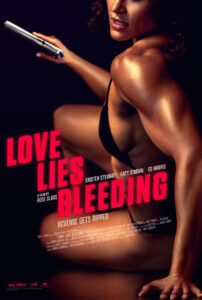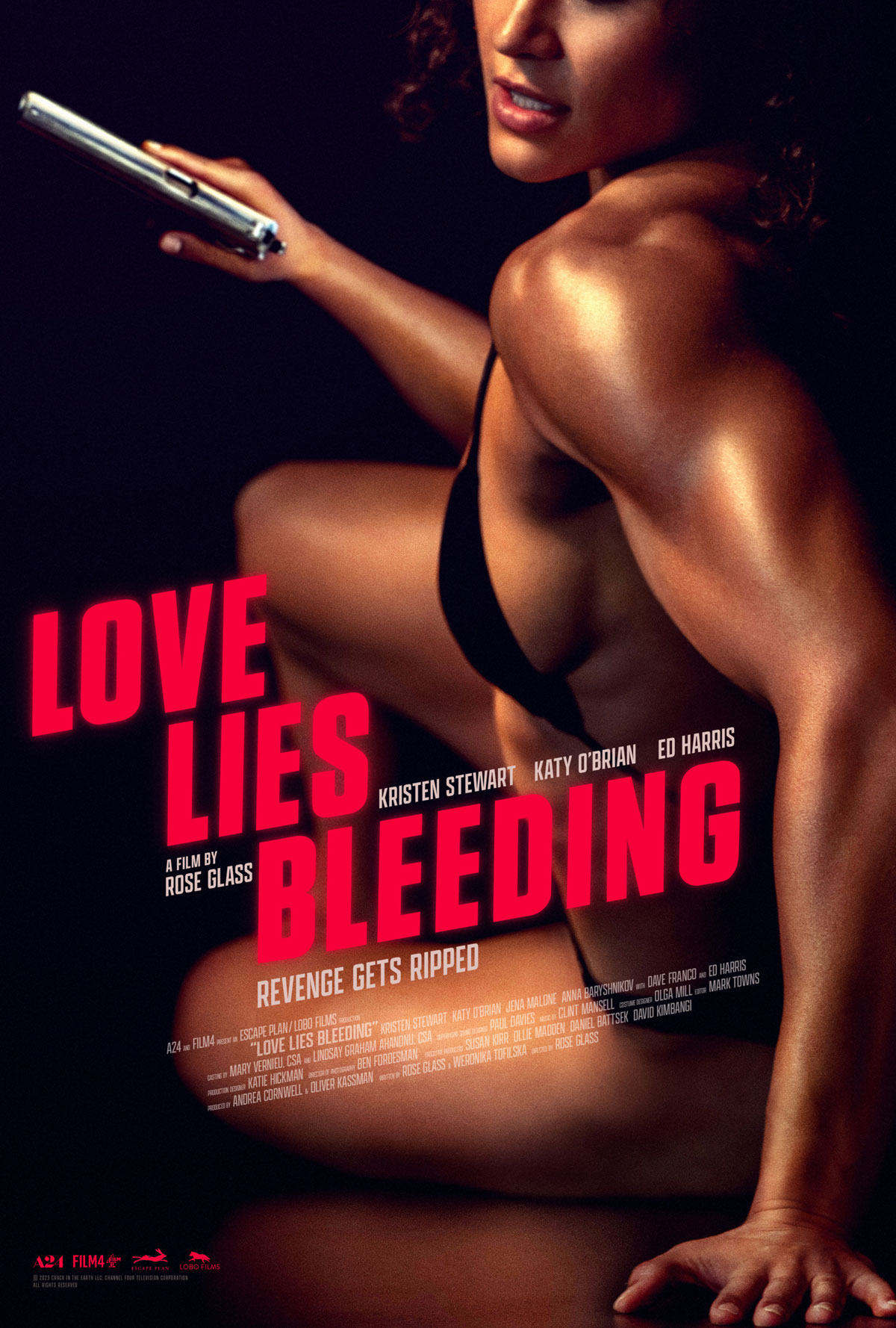
Director: Rose Glass
Release Year: 2024
Runtime: 1h 44m
First Drive-Away Dolls and now this. You’d think after two crime-based, lesbian-centric films in a row that I had a kink. Or a type. Or even a fleeting preference for this kind of movie. I do not. It is pure coincidence, and let’s leave it at that. Beyond those two superficial genre markers, however, these are very different pieces of cinema. And, look, I won’t claim to understand everything that’s going on in Love Lies Bleeding. In fact, I’m not even sure I care what’s going on. The filmmaker, Rose Glass, clearly has something in her head about how love works and how it collides with lust and loyalty, so who am I to question her vision? Just kidding, I’ll totally question it. Because that’s the asshole I am. And it’s my Website.
Once again, we’ve set things in the past. The glorious year of 1989. Though certainly not the 1989 I remember. And perhaps it’s because the film takes place in the red-necky suburban wasteland of New Mexico, but I was definitely getting more like 1986 vibes off what was going on. This was the year Paul’s Boutique came out. And Dead Poets Society. There was definitely no Eazy-E pumpin’ in this film. It didn’t feel of that era at all. Again, I’ll chalk that up to the location — but maybe the fact Glass was a British newborn in 1989 has something to do with something feeling just a tad off as far as time and place go. But I’m probably the only person focused on the fact the soundtrack, and something that I can’t quite pin down, felt a world away from what was actually happening in culture and society at the time.
Let’s get this straight: this is a bizarre movie. Go read a synopsis of the thing. It’s like so-and-so goes to so-and-so’s house to see so-and-so, who isn’t there because he’s busy killing so-and-so, who has left his gun on a table because his cat was at the vet with so-and-so who was blackmailing this person to kill that person while also sleeping with another person to get the original so-and-so off the hook for a murder she thinks she committed but really didn’t. Now, that’s not at all the plot here (there is no cat), but there is a reason Glass set it in 1989. Because none of this nonsense would have happened if there were cell phones. People wouldn’t constantly be having to drive somewhere to talk to someone to see if the other person is home to warn them about whatever. You get the idea; there are just a lot of mechanics to maneuver people where they need to be to keep the action going and the twists and turns alive. It’s all pretty manic and reliant on coincidence and happenstance.
And, honestly, maybe that’s the point. Because our protagonist, Lou (Kristen Stewart), is head over heels in lust with the new, mysterious bodybuilder in town, Jackie (Katy O’Brian). So much so that she lets Jackie work out for free at the incredibly shitty-looking gym she manages, plies her with free ‘roids and lets her move in with her after a day. This seemingly homeless, super-shady woman who dreams of going to Vegas to win a bodybuilding contest. But, hey, she’s hot, muscular and bi-sexual! Win, win. Except she slept with Lou’s brother-in-law (Dave Franco) in his car her first night in town — seemingly to score a job — and obviously has some demons to exercise (no pun intended). But, it seems, Lou also has her own mysterious past full of violence and weirdness that we’re confusingly given glimpses of throughout the film. What we do know is that her Crypt Keeper-looking dad, who is also named Lou, is played by a weirdly bug-loving, gun-range owning Ed Harris. He is also being tracked by the F.B.I., the reason for which is the most under-developed part of the story. Because, at the heart of things is this passionate, chaotic, manic love between Lou and Jackie. Which becomes way more insane due to Jackie’s ‘roid habit (which, reminder, was spurred on by Lou pushing them on her).
If this was an after-school special, it would be called “Steroids Are Dangerous.” Or, alternately, “The Danger of a Hot, Burning Love.” Both are dangerous, but only one gives you an enlarged heart. I’ll let you guess which. Again, I don’t think the ‘roid rage is the point of this tale, but it certainly plays its part. Instead we focus on the withdrawn character of Lou. The young lesbian, not the dad. It’s never really made clear why she’s so withdrawn, frankly. It’s hinted at that this small town is too small for her, and she only sticks around because her sister seems to end up in the hospital every couple weeks because Lou’s aforementioned brother-in-law puts her there. But she doesn’t really seem to have grander aspirations than running the gym and having the occasional dalliance with the other gay women woman in town. I dunno, why is everyone in movies always “too big” for their town? She seems just the right size. And then when the first bi-sexual blows into town, she’s down for the count. Which isn’t a euphemism, but should be. Somehow she doesn’t put two and two together that the job Jackie slept with the brother-in-law to get is at the gun range owned by… Lou Sr. Yes, Ed Harris in the silliest Gallagher bald hair drape ever. Stuff like this just kind of happens, I guess. But it’s not a good situation considering Jackie’s Lou is estranged from her creepy dad, who has just hired her somewhat sketchy lover. This ultimately results in that so-and-so going to kill so-and-so to keep so-and-so from talking to the other so-and-so in order to… You get the point. Catalyst meet chaos.
Even as the narrative gets overly convoluted as the thing progresses, it did hold my attention. Stewart has a very specific acting style that is incredibly unglamorous. It’s low-key and quiet in a way someone with her name and potential star-power seldom exhibits. With her greasy mullet and cut-sleeve t-shirts, she’s certainly not a glamorous character. But as we proceed and learn in little hints that she’s haunted by a mysterious past we never really learn a whole lot about, it plays even more into her kind of quiet desperation to be with and near the much more dynamic and physically imposing Katy O’Brian. An actress and character who is literally larger than life, while Stewart seems almost ghostly and on the edge of malnourished. Glass certainly takes a lot of artistic liberty with how police work and federal investigations go, but there is a surreal, dream-like quality to this whole movie, so it’s almost forgivable. She definitely watched True Romance a time or seventeen, as the plotting, love story and violence all feel of a piece. But she also sprinkles in some surrealism into the film. Some touches that don’t always work — and might make a Darren Aronofsky wonder WTF — but at least attempt to craft something different and original. Even if it’s not wholly original. At the end, it’s a weird movie. Another one that’s probably, most definitely not made for me. Which doesn’t mean I can’t appreciate the attempt.


